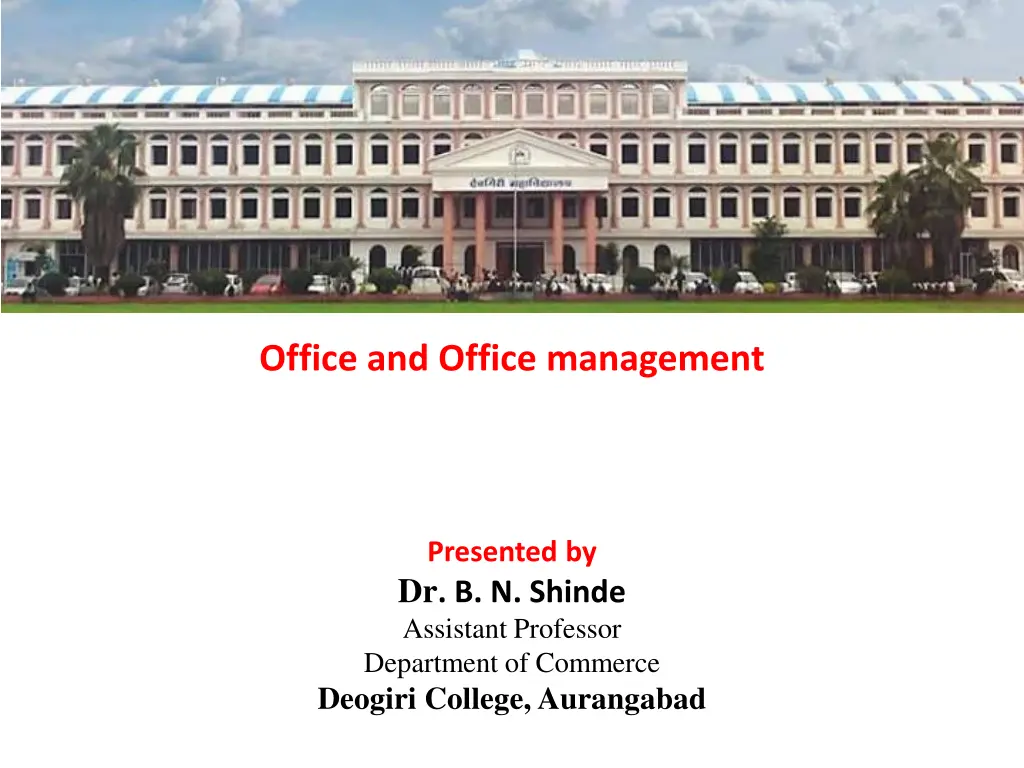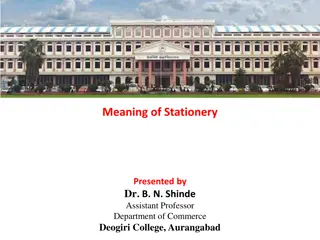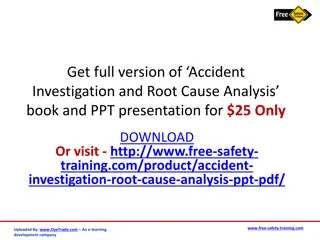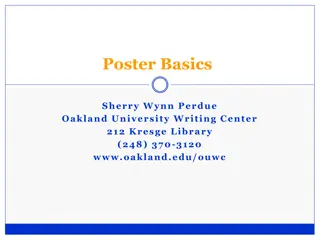
Understanding Office Management in Modern Organizations
Explore the fundamentals of office management presented by Dr. B. N. Shinde, covering topics like the role of management in organizations, the definition of office, and the importance of office management in both business and non-business settings. Gain insights into the functions of office management, including planning, organizing, guiding, coordinating, and controlling activities for efficient and economical operations.
Download Presentation

Please find below an Image/Link to download the presentation.
The content on the website is provided AS IS for your information and personal use only. It may not be sold, licensed, or shared on other websites without obtaining consent from the author. If you encounter any issues during the download, it is possible that the publisher has removed the file from their server.
You are allowed to download the files provided on this website for personal or commercial use, subject to the condition that they are used lawfully. All files are the property of their respective owners.
The content on the website is provided AS IS for your information and personal use only. It may not be sold, licensed, or shared on other websites without obtaining consent from the author.
E N D
Presentation Transcript
Office and Office management Presented by Dr. B. N. Shinde Assistant Professor Department of Commerce Deogiri College, Aurangabad
Unit 1: Office and Office management Introduction: Management is the key to success for any organization; it is universally applied in all fields of organized human activity. Therefore office management is an integral part of the total management of the organization. It provides centralized guidance, which diverts the individual efforts towards a common goal or objectives. Every office therefore requires making decision, co-ordinate activities, handling personnel and conducting evaluation of performance directed toward the objectives. Office activities are also camed on by a group of people (office personnel) working with appropriate means (tools and equipment) and under suitable environment for a common objective or purpose - that of providing efficient and economical clerical service to the ' organization. It is the function of Office Management to organize, guide and control the activities of the office personnel to achieve these common objectives. That is why Office Management has been defined as the art of guiding the personnel of the office in the use of means appropriate to its environment in order to achieve its specific purpose.
What is Office? a building, where a company conducts its business. A company can have just one office, known as its home office, or a main office and a variety of field offices or branch offices. All of these offices are involved in some way in the business of A location, usually a building or portion of the company.
Definitions of Office The term office has been defined differently by different authors. In the simple meaning of the term, office denotes a place where business is carried on. According to Denyer, Office means a place where clerical operations are carried on. This definition of office states that office is primarily concerned with clerical operations and so office work is primarily a paper work. The modern writers on the subject are not in the view of office being a place but it is a function. Thus, it is a mistake to regard an office as a specific place and we are to conclude that office exists anywhere at which the work is performed. As a function office can plan, organize, co-ordinate, standardize and supervise paper work, wherever it is done and whosoever does it.
What is office management Meaning of Office management: Office management is not only necessary to business organization but also essential to non-business organization. In modern internet society also, there is a need of direction to the individual efforts towards common purpose or objective. The direction is given from a place i.e. office. Office management refers to the process of planning, organizing, guiding, communicating, coordinating and controlling the activities of a group of people who are working to achieve business objectives efficiently and economically. directing,
Definition of Office Management: Office management can been defined as the art of guiding, directing coordinating and controlling the people of an organization in order to achieve specified objective within a time schedule. Office management involves the planning, design, implementation of work in an organization and its offices. This includes creating a focused work environment, and guiding and coordinating the activities of office personnel to achieve business goals. These activities are evaluated and adjusted to improve and maintain efficiency, effectiveness, and productivity.
Elements of Office Management Elements of office management are termed as pillars of a building. If pillar is strong, certainly, the building is also strong. Hence, efficient functioning of office management is based on the elements of office management. Following are the essential management. elements of office
Conti. 1. Personnel Office personnel are actually performing the office work. Generally, the selection and placement of office personnel is carried on by the office manager in small organization. In large organization, staffing is carried on by the human resource management department. In both the case, the office work is to be performed by allocating the work to each individual according to their efficiency, guide the personnel to do the work with the help of means available in an office within a specified time and control the activities of office personnel. The office manager has to do all these activities. 2. Means Means refers to tools used to perform the office work. Means include pen, pencil, eraser, paper, ink, office forms, typewriter, computer, printer, calculator and the like. Adequate tools have been supplied in an office and put them to the most efficient and economical use for achieving objectives.
Conti. 3. Environment The nature of business determines the environment of an office. The various office works have to be carried on under a particular condition or environment. A working environment is created and maintained for the smooth performance of office work. It is the duty and responsibility of an office manager to bring suitable environment by adopting various procedures and practice. 4. Purpose The office personnel must be aware of the purpose for which a particular work is carried on and the impact of such work on others performance. The office manager teaches the purpose to office personal. If not so, the performance of office work does not bring the most efficient and economical use of office resources and achieve the objectives.
Importance of Office 1. Information Center: Office is an information center or a data bank of all information, on which the business that it does is carried. All present and past figures of business that it does should be in the office. Based on this information, the office plans, forecasts and controls its operation, its area of operation. 2. Office Serves as a Channel of Communication: It is evident that without any communication, the office just cannot function and it cannot serve its purpose. Every communication, especially the written communication flows from the top to the bottom, and the reporting has to flow from bottom to the top. The office would fall if the communications are not flowing frequently and the reports are not made available, or presented to the higher authorities within the stipulated time.
Importance of Office 3. Aids in Co-Ordination: The objectives of any office won t be met if there is no proper co-ordination amongst the employee. The employer-employee relation and the employee- employee relation have to be good if an effective co-ordination has to be built up. An effective co-ordination jacks up the spirit of work, tightens the unity and strengthens the moral of every employee working in the organization. Aid to it, the necessary information and the back-up from the top level is needed for promoting co-ordination. 4. Importance in Relation to Government and General Public: Today, for every business to exist, it has to follow certain guidelines, rules and regulations as formulated by the government. Every business unit today is considered to be revenue generating as well as a social institute. Every office has a wing, and it is a link between the society and the government. It is also a link between people and the government. Hence an office has to create a proper type of image in the mind of the people for building a proper brand image and a corporate image.
Importance of Office 5. Aid in Managerial Control: Control is a combination of corrective and measuring techniques of the performance of sub-ordinates in order to make sure that the objective of an enterprise is achieved and accomplished. Control requires to establish standards and then measuring the standards within the stipulated time, and within the resources. It actually measures: (i) Whether the standards set are achieved, and (ii) If not achieved, then what was the deviation and what the percentage of deviation was. Once these are determined, the various means of control are devised to put the office or an enterprise on the right track.
Importance of Office 6. Importance in Relation to Customers: The actual importance of any office is its relation with its customer. It is the customer who brings the business to the office and, hence, a customer is the king. Except for the government office, every other business organization depends on its customer for its business to generate the revenue. Hence the importance of office in relation to its customer is of great significance customer , now, is the emperor . Keeping this in mind, the orders received by the customer, their enquiries and their complaints are taken care by the office through direct and personal contacts. Now a days, the modern office has a very important person the Guest Attending Officer [GAO] who attends all the customers and informs them everything directly, personally, or on the phone, about the company, its activities, and about its business.
Importance of Office 7. Importance to Shareholder: Every office serves an important link between the shareholder on the one hand and the company on the other. The issue of dividend on the shares, the transfer of the shares, issue of the notice of the meetings of the company, and answering about all the queries to the shareholder is of great importance and these cannot be achieved or obtained without establishing a proper office. 8. Importance of the Worker: For maintaining a good work force, a good environment, free from official politics, free from partiality and an effective relation, in the form of employee-employer and employer-employee; a relationship is needed. Payment of the salary in time, payment of wages in time, preparation of salary sheet, maintenance of attendance, allowing workers to avail leave during their time of emergency are some of the important functions that has to be performed by the office. Hence these are the few points that has to be noted, practiced and generalized in every office so that the office functions smoothly and brilliantly.
Basic functions of modern Office 1. Receiving Information The information may be received from within the organization or outside the organization. If information is received from various departments and executives of the organization, it is termed as information received within organization. If information is received from outsiders say customers, government departments, share holders, suppliers, they are termed as information received from the outside organization. 2. Collecting Information Collecting information is differing from receiving information. If an office gets information voluntarily, it is receiving information. If an office gets information after an enquiry or demands, it is collecting information. Enquiry or demands may be made through letters and/or telephone calls. Managers or departmental executives can visit other offices to collect information. Information may be received or collected if it helps the management in taking decisions.
Basic functions of modern Office 3. Recording Information Both received and collected information should be properly recorded in suitable form. An office determines the form, number and nature of records to be maintained according to the needs. Some forms are specified in the respective statutes. For example, Indian Companies Act requires the companies to maintain books and registers in a specified way. 4. Creating Records The information should be converted into according to the needs and prepare financial and cost accounts, production details, sales particulars, man hours worked, price list and the like. These records are used as a reference library of the management.
Basic functions of modern Office 5. Processing or Arranging Information The received and collected information have to be arranged in a systematic way. If not so, there is no use of such received and collected information. statements and statistical statements are examples of arranged information. Financial 6. Computation and Statistical Work Calculations have to the made for preparing statistical charts and / or diagrams. Cost Sheet, Production Budget, Sales Budget, Budget, Fund Flow Statement Statements are also prepared. Purchase Budget, and Master Flow Cash
Basic functions of modern Office 7. Analyzing Information One has to analyze the information to find a truth. The hidden fact has to be highlighted through proper analysis. Reports are also drawn up out of analysis. Market analysis, Production Report, Financial Report and Employees Report are also prepared. 8. Maintenance of Records Created records should be maintained in a proper way. The future reference will be very easy through proper maintenance of records.
Basic functions of modern Office 9. Retention of Records Records may be classified into two types i.e. necessary records and outdated records. The necessary records should be preserved under the control and supervision of office manager. The outdated records can be destroyed. 10. Communication of Information The office supplies information from its records as and when required by management for taking decisions. The information may be supplied verbally or in writing. Normally, the urgent information is supplied verbally.






















